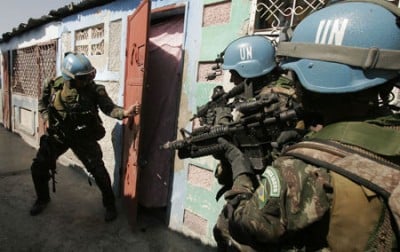The Real Story About Canada’s Role in Haiti

Step one for everyone trying to make the world a better place should be listening to those they wish to help.
This is certainly true in the case of Haiti, a long-time target of Canadian ‘aid’. But, while Haitians continue to criticize Ottawa’s role in their country, few Canadians bother to pay attention.
After Uruguay announced it was withdrawing its 950 troops from the United Nations Mission to Stabilize Haiti last month, Moise Jean-Charles, took aim at the countries he considers most responsible for undermining Haitian sovereignty. The popular senator from Haiti’s north recently told Haiti Liberté:
“Brazil, Argentina, and Uruguay are not the real occupiers of Haiti. The real forces behind Haiti’s [UN administered] military occupation — the powers which are putting everybody else up to it — are the U.S., France, and Canada, which colluded in the Feb. 29, 2004 coup d’etat against President [Jean-Bertrand] Aristide. It was then they began trampling Haitian sovereignty.”
For the vast majority of Canadians, Jean-Charles’ comment probably sounds like the ramblings of a crazy person. When the media in this country focuses on Haiti, it is typically to highlight Canadian aid projects. Yet, here is one of Haiti’s most popular politicians telling the press (and audiences throughout South America) that Canada helped overthrow its elected government and continues to undermine its sovereignty.
Jean-Charles’ opinion is not uncommon in Haiti. Since Aristide’s government was overthrown in February 2004, Haiti Progrès and Haiti Liberté newspapers have described Canada as an “occupying force,” “coup supporter” or “imperialist” at least a hundred times. Haiti’s left-wing weeklies have detailed Ottawa’s role in planning the coup; destabilizing the elected government; building a repressive Haitian police force; justifying politically motivated arrests and killings; militarizing post-earthquake disaster relief; pushing the exclusion of Haiti’s most popular party, Fanmi Lavalas, from participating in elections.
While the above-mentioned information has been copiously detailed in Haitian newspapers, as well as English-language books, reports and left-media, Canada’s dominant media rarely critically discusses this country’s role in Haiti. During Montréal’s recent municipal election, for instance, the media largely ignored the eventual winner’s role in undermining Haitian democracy and justifying repression. Aside from a piece in the Montréal Media Co-op by Dru Oja Jay, no media seems to have discussed Denis Coderre’s previous position as Prime Minister Paul Martin’s point person on Haiti.
Will the dominant media also ignore the 10-year anniversary of the coup? Without pressure it is likely, even though the date remains a potent political symbol.
Haiti continues to be occupied by the UN force brought by the U.S./France/Canada military invasion to overthrow Aristide. And that UN force’s neglect for Haitian life has led to an ongoing cholera outbreak that has left 8,500 dead and nearly 700,000 ill.
At the electoral level, the party Ottawa helped overthrow, Fanmi Lavalas, continues to be excluded from participating in elections. This has been to the benefit of Haiti’s notoriously corrupt political class, including current president Michel Martelly, who is unlikely to have won a fair election (and is facing growing protests calling on him to resign).
“It is clear that Martelly does not have the legitimacy or the credibility to lead the country,” Senator Jean-Charles told this week’s Haiti Liberté after 10,000- 50,000 took to the streets of Port-au-Price. “We are asking the Americans, French, and Canadians to come and collect their errand boy because he cannot lead the country any more.”
On February 28, 2014 tens of thousands are likely to hit the streets across Haiti to once again express their rejection of the U.S./France/Canada coup. Is any major news agency in this country prepared to mark the occasion by telling Canadians what their government has done over the past decade to undermine Haitian sovereignty and democracy?

